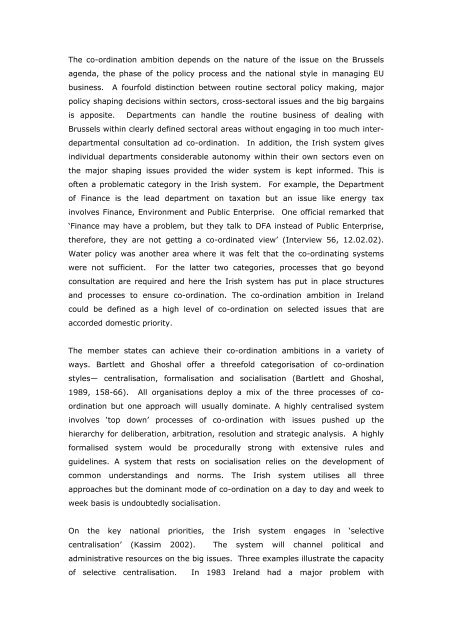Managing Europe From Home: The Europeanisation of the Irish ...
Managing Europe From Home: The Europeanisation of the Irish ...
Managing Europe From Home: The Europeanisation of the Irish ...
You also want an ePaper? Increase the reach of your titles
YUMPU automatically turns print PDFs into web optimized ePapers that Google loves.
<strong>The</strong> co-ordination ambition depends on <strong>the</strong> nature <strong>of</strong> <strong>the</strong> issue on <strong>the</strong> Brussels<br />
agenda, <strong>the</strong> phase <strong>of</strong> <strong>the</strong> policy process and <strong>the</strong> national style in managing EU<br />
business. A fourfold distinction between routine sectoral policy making, major<br />
policy shaping decisions within sectors, cross-sectoral issues and <strong>the</strong> big bargains<br />
is apposite. Departments can handle <strong>the</strong> routine business <strong>of</strong> dealing with<br />
Brussels within clearly defined sectoral areas without engaging in too much interdepartmental<br />
consultation ad co-ordination. In addition, <strong>the</strong> <strong>Irish</strong> system gives<br />
individual departments considerable autonomy within <strong>the</strong>ir own sectors even on<br />
<strong>the</strong> major shaping issues provided <strong>the</strong> wider system is kept informed. This is<br />
<strong>of</strong>ten a problematic category in <strong>the</strong> <strong>Irish</strong> system. For example, <strong>the</strong> Department<br />
<strong>of</strong> Finance is <strong>the</strong> lead department on taxation but an issue like energy tax<br />
involves Finance, Environment and Public Enterprise. One <strong>of</strong>ficial remarked that<br />
‘Finance may have a problem, but <strong>the</strong>y talk to DFA instead <strong>of</strong> Public Enterprise,<br />
<strong>the</strong>refore, <strong>the</strong>y are not getting a co-ordinated view’ (Interview 56, 12.02.02).<br />
Water policy was ano<strong>the</strong>r area where it was felt that <strong>the</strong> co-ordinating systems<br />
were not sufficient. For <strong>the</strong> latter two categories, processes that go beyond<br />
consultation are required and here <strong>the</strong> <strong>Irish</strong> system has put in place structures<br />
and processes to ensure co-ordination. <strong>The</strong> co-ordination ambition in Ireland<br />
could be defined as a high level <strong>of</strong> co-ordination on selected issues that are<br />
accorded domestic priority.<br />
<strong>The</strong> member states can achieve <strong>the</strong>ir co-ordination ambitions in a variety <strong>of</strong><br />
ways. Bartlett and Ghoshal <strong>of</strong>fer a threefold categorisation <strong>of</strong> co-ordination<br />
styles— centralisation, formalisation and socialisation (Bartlett and Ghoshal,<br />
1989, 158-66). All organisations deploy a mix <strong>of</strong> <strong>the</strong> three processes <strong>of</strong> coordination<br />
but one approach will usually dominate. A highly centralised system<br />
involves ‘top down’ processes <strong>of</strong> co-ordination with issues pushed up <strong>the</strong><br />
hierarchy for deliberation, arbitration, resolution and strategic analysis. A highly<br />
formalised system would be procedurally strong with extensive rules and<br />
guidelines. A system that rests on socialisation relies on <strong>the</strong> development <strong>of</strong><br />
common understandings and norms. <strong>The</strong> <strong>Irish</strong> system utilises all three<br />
approaches but <strong>the</strong> dominant mode <strong>of</strong> co-ordination on a day to day and week to<br />
week basis is undoubtedly socialisation.<br />
On <strong>the</strong> key national priorities, <strong>the</strong> <strong>Irish</strong> system engages in ‘selective<br />
centralisation’ (Kassim 2002). <strong>The</strong> system will channel political and<br />
administrative resources on <strong>the</strong> big issues. Three examples illustrate <strong>the</strong> capacity<br />
<strong>of</strong> selective centralisation. In 1983 Ireland had a major problem with



